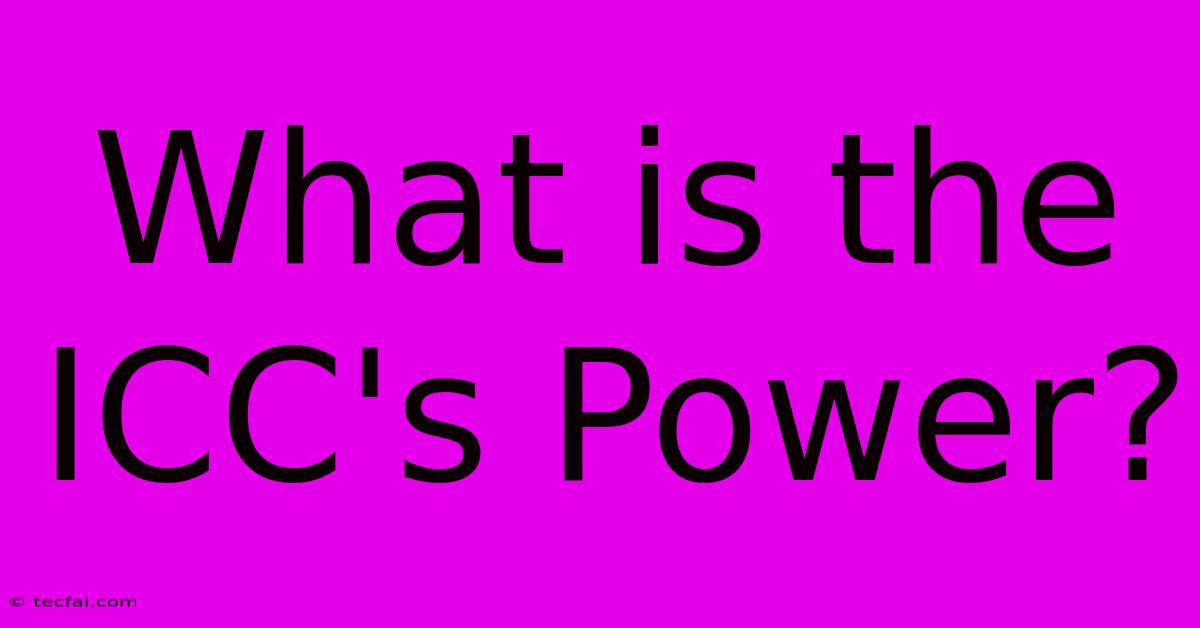What Is The ICC's Power?

Discover more detailed and exciting information on our website. Click the link below to start your adventure: Visit Best Website tecfai.com. Don't miss out!
Table of Contents
What is the ICC's Power? Understanding the International Criminal Court's Jurisdiction and Limitations
The International Criminal Court (ICC) stands as a landmark institution in international law, aiming to hold individuals accountable for the most serious crimes of concern to the international community. But what exactly is the ICC's power? It's a question with nuanced answers, encompassing its jurisdiction, limitations, and the ongoing debate surrounding its effectiveness.
The ICC's Jurisdiction: Defining its Reach
The ICC's power rests primarily on its jurisdiction over four core crimes:
- Genocide: The intent to destroy, in whole or in part, a national, ethnic, racial, or religious group.
- Crimes Against Humanity: Widespread or systematic attacks against a civilian population, including murder, extermination, enslavement, deportation, and persecution.
- War Crimes: Grave breaches of the Geneva Conventions and other international humanitarian law during armed conflict.
- The Crime of Aggression: Planning, preparation, initiation, or execution of an act of aggression. This is the most recently added crime and its definition and application remain subject to ongoing discussion.
It's crucial to understand that the ICC doesn't have universal jurisdiction. Its power is limited in several ways:
Limitations on the ICC's Power:
- State Referral: A state can refer a situation to the ICC, giving the court permission to investigate and prosecute crimes committed within its territory or by its nationals.
- UN Security Council Referral: The UN Security Council can refer a situation to the ICC, even if the state in question isn't a member of the Rome Statute (the treaty establishing the ICC). This is a powerful mechanism but also subject to political considerations.
- Complementarity: The ICC only acts when national courts are unwilling or unable genuinely to investigate or prosecute. This principle of complementarity is designed to avoid interfering with national judicial systems. It emphasizes the primary role of national courts in holding individuals accountable.
- Geographic Limitations: The ICC's jurisdiction is geographically limited to states that have ratified the Rome Statute or those that have accepted the court's jurisdiction through a UN Security Council referral. Many powerful nations, notably the United States, China, and Russia, are not members.
- Limitations on Individuals: The ICC prosecutes individuals, not states. It cannot impose sanctions or other measures against entire governments.
The ICC's Enforcement Power: Challenges and Debates
While the ICC can issue arrest warrants and try individuals, its enforcement power is ultimately limited. It relies on the cooperation of states to arrest and surrender suspects. This presents a significant challenge; some states may refuse to comply with the court's requests, hindering its ability to bring perpetrators to justice.
The effectiveness of the ICC is a subject of ongoing debate. Critics point to its slow pace, high costs, and limited reach as weaknesses. Others argue that its establishment itself represents a significant step towards international justice, even if its impact remains incomplete. The court's existence serves as a powerful deterrent for potential perpetrators of atrocities and fosters accountability in situations where national justice systems fail.
The Future of the ICC: Adaptation and Evolution
The ICC continues to adapt and evolve in response to challenges and criticisms. Efforts to improve efficiency, streamline processes, and expand cooperation with states are crucial for its long-term success. The ongoing discussion surrounding the crime of aggression, along with persistent efforts to broaden its membership and strengthen its enforcement mechanisms, will shape its power and influence in the years to come. Its future effectiveness will depend largely on the continued commitment of states to uphold international law and cooperate with the court's efforts to bring those responsible for atrocities to justice.

Thank you for visiting our website wich cover about What Is The ICC's Power?. We hope the information provided has been useful to you. Feel free to contact us if you have any questions or need further assistance. See you next time and dont miss to bookmark.
Featured Posts
-
Lakers Vs Magic Recap Nov 22 2024
Nov 22, 2024
-
Morayo Album Out Now Wizkid
Nov 22, 2024
-
Icc Arrest Warrant For Israeli Pm
Nov 22, 2024
-
Pam Bondi 2020 Election False Claims
Nov 22, 2024
-
Rana Bowls Head Out Aus Vs Ind
Nov 22, 2024
